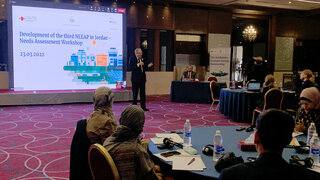Assessing the needs to improve energy efficiency in Jordan

Following their initial task force meeting on Monday, several energy experts from the German Energy Agency (dena), ECO Consult, and the Ministry of Energy and Mineral Resources (MEMR) attended the assessment workshop to discuss the strategic objectives of Jordan’s energy efficiency action plan and outline a clear roadmap for development.
An introductory session by dena discussed the international experiences with implementing NEEAPs in different countries and suggested how similar measures could be properly adapted to the Jordanian national plan. Another session by ECO Consult displayed the results of the stakeholder interviews conducted with different organisations and sectors to gain their feedback on the first two NEEAPs. The feedback revealed that several institutions lacked sufficient awareness of the previous NEEAPs, leading to inadequate co-ordination among the institutions. Additionally, progress reporting was found to be challenging due to an absence of data monitoring and reporting within the targeted sectors, contributing overall to insufficient national follow-up of the action plans despite ministerial endorsements. The implementation percentages achieved for the first and second NEEAPs were estimated to be 40.0% and 46.4% respectively. Recommendations for the third NEEAP were provided, such as focusing on sectors with higher energy efficiency potential, establishing suitable monitoring programs on a national level for concerned stakeholders, and redesigning the NEEAP structure to identify synergies with current sustainable energy plans.
The sessions concluded with an open discussion among the partners. Emphasis was put on learning from previous experiences, determining suitable approaches for the implementation of the measures, and proposing adequate methods for data collection and monitoring. Additionally, key points of the action plan were considered, including its scope and targets, as well as the degree of involvement of the stakeholders during the next phase.